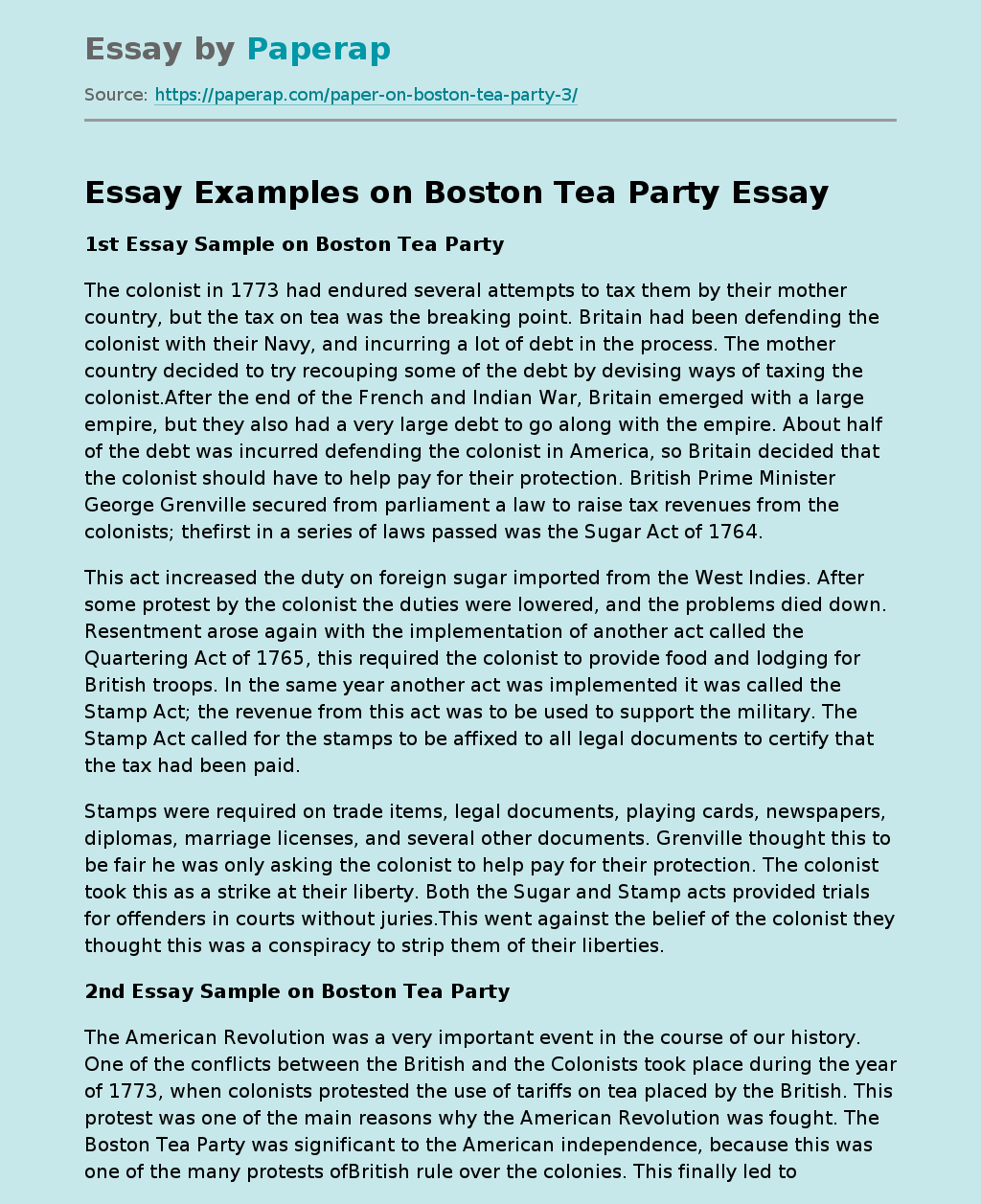Essay Examples on Boston Tea Party
1st Essay Sample on Boston Tea Party
The colonist in 1773 had endured several attempts to tax them by their mother country, but the tax on tea was the breaking point. Britain had been defending the colonist with their Navy, and incurring a lot of debt in the process. The mother country decided to try recouping some of the debt by devising ways of taxing the colonist.After the end of the French and Indian War, Britain emerged with a large empire, but they also had a very large debt to go along with the empire.
About half of the debt was incurred defending the colonist in America, so Britain decided that the colonist should have to help pay for their protection. British Prime Minister George Grenville secured from parliament a law to raise tax revenues from the colonists; thefirst in a series of laws passed was the Sugar Act of 1764.
This act increased the duty on foreign sugar imported from the West Indies.
After some protest by the colonist the duties were lowered, and the problems died down. Resentment arose again with the implementation of another act called the Quartering Act of 1765, this required the colonist to provide food and lodging for British troops. In the same year another act was implemented it was called the Stamp Act; the revenue from this act was to be used to support the military. The Stamp Act called for the stamps to be affixed to all legal documents to certify that the tax had been paid.
Stamps were required on trade items, legal documents, playing cards, newspapers, diplomas, marriage licenses, and several other documents. Grenville thought this to be fair he was only asking the colonist to help pay for their protection. The colonist took this as a strike at their liberty. Both the Sugar and Stamp acts provided trials for offenders in courts without juries.This went against the belief of the colonist they thought this was a conspiracy to strip them of their liberties.
2nd Essay Sample on Boston Tea Party
The American Revolution was a very important event in the course of our history. One of the conflicts between the British and the Colonists took place during the year of 1773, when colonists protested the use of tariffs on tea placed by the British. This protest was one of the main reasons why the American Revolution was fought. The Boston Tea Party was significant to the American independence, because this was one of the many protests ofBritish rule over the colonies. This finally led to a war which in the end granted the colonies their independence.
In the year of 1767, Parliament passed the Townshend Acts, which were laws that put taxes on various products imported into the British colonies. This brought so much controversy, that in 1770 these laws were repealed. The merchants in Boston avoided the act by receiving smuggled tea from Dutch traders. In 1773, the Parliament decided to pass the Tea Act. This was designed to aid the people in East India with financial problems.
The tea sent to the colonies were to be carried only in East India Company ships. Also, the tea was to be sold only through its own agents, evading the independent colonial shippers and merchants. This created a monopoly by selling tea at a lower price than both the colonies and Britain. The idea of monopoly drove the colonist merchants into an alliance with extremists led by Sam Adams and his Sons of Liberty. Many of the big cities in the colonies canceled their orders of tea, and merchants refused shipments.
In the city of Boston, the royal governor Thomas Hitchinson, who was determined to maintain the law and keep the shipments flowing, allowed three ships, the Dartmouth, Beaver, and Eleanor, to deposit their cargoes and that their tasks should be taken very seriously. On the night of December 16, 1773, a group of about 60 men, encouraged by a large crowd of Bostonians, put on some Indian clothing and head dresses.
Essay Examples on Boston Tea Party. (2019, Oct 10). Retrieved from https://paperap.com/paper-on-boston-tea-party-3/

